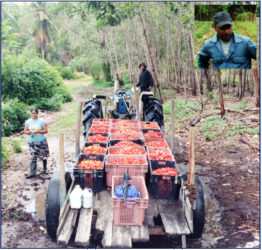Ravi Doobay is one of several farmers who have come from various parts of the country to settle on farmlands at Laluni. Most of them came here at the invitation of the Demerara Tobacco Company to plant tobacco to feed the company’s production process. With the loss of the tobacco market the farmers turned to cash crops with Doobay and his family cultivating an assortment of vegetables including sweet peppers, hot peppers, boulanger and a variety of fruit, including cherries.
Other farmers cultivate cherries too, their market being the nearby Demerara Distillers Ltd. manufacturers of the popular TOPCO fruit juice brand. Cherries, Doobay says, can be a profitable investment for fruit farmers. A five-gallon pail of the fruit can fetch between $1,500 and $2,000 on a market that places a high premium on the pulp that makes jams and juices.

Doobay has been farming at Area Two in Laluni for more than 18 years and when Stabroek Business visited his farm earlier this week his pickers has only just completed harvesting yet another consignment of cherries and loaded them onto a truck for delivery to DDL which continues to provide a steady market. Finding markets for his other crops has been more challenging. When this newspaper spoke with Doobay it was the scarcity of markets for his sweet peppers that was on his mind. Visits to the farm by bargain-hunting vendors are not unusual, though in order to secure better prices for his sweet peppers and other fruit and vegetables Doobay must make regular treks to markets in the city where retail purchasers offer better prices.
Doobay and his family continue to rely on farm-to-market arrangements that do not benefit from the alternative markets—for peppers, for example—that might otherwise have been afforded by a more robust manufacturing sector.
On the basis of the available evidence other farmers at Laluni could do with better access to markets for their produce.




